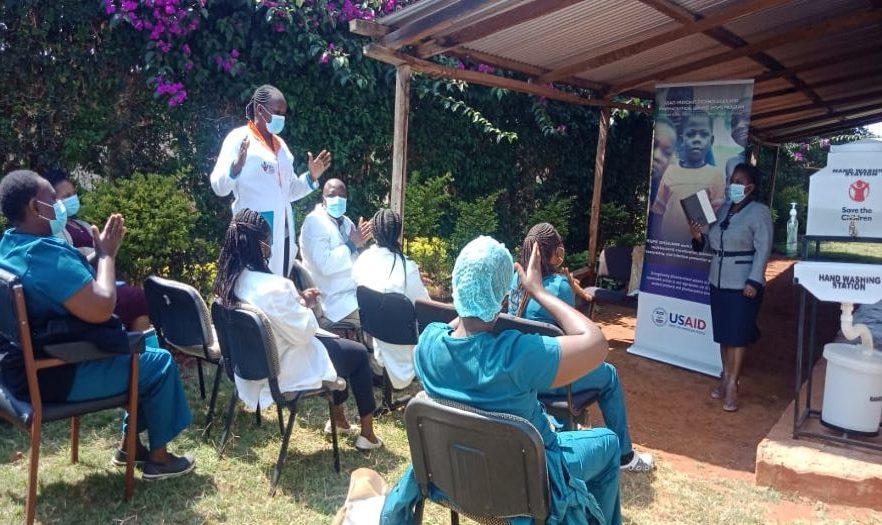Preventing COVID-19 Transmission in Kenyan Prisons
When Kenya’s Ministry of Health confirmed the first coronavirus disease (COVID-19) patient in the country on March 12, 2020, there was fear, panic, and disbelief among health care workers (HCWs) and the community at large. As the COVID-19 positivity rate increased, so did the unique clinical and public health challenges in health care settings. Health care facilities in prisons were no exception, facing a plethora of challenges exacerbated by crowded living conditions. Prison HCWs play an essential part in prison health care services provision that includes handling of patients, which involves COVID-19 case management and processing of samples for diagnosis. They, furthermore, generate health care waste at their point of service and are exposed to occupational health hazards and potentially, many pathogens.
In March 2020, USAID MTaPS was tasked with supporting the USAID COVID-19 response in several countries including Kenya. In Kenya, reaching prisons with measures to help contain the spread was part of MTaPS’ pandemic response support. Working collaboratively with the Ministry of Health, MTaPS provided technical support to 13 counties, focusing on COVID-19 infection prevention and control (IPC) interventions including targeted support for training; provision of guidelines; various job aids and information; and education and communication materials. MTaPS organized COVID-19 IPC and health care waste management training sessions for HCWs drawn from public hospitals, private hospitals, faith-based hospitals, and prisons in the respective counties.
Building the Capacity of Health Care Workers in Prisons
To contain the spread of COVID-19 in selected prisons across 13 counties, MTaPS prioritized capacity building of HCWs on risk mitigation techniques such as hand hygiene, mask wearing, and waste management.
MTaPS employed a layered approach to train prison HCWs followed by institutional strengthening of the prisons themselves. To reach a large number of HCWs rapidly, master trainers were identified and trained from the supported counties as the champions for capacity building of the targeted prisons’ staff. Posters and job aids were distributed during the training sessions. Further, as part of the training, the HCWs developed action plans to guide implementation of prioritized post-training interventions in their respective prisons.
A total of 364 health care workers from prisons across 13 counties were trained, following which prison health workers in Kisumu county established an IPC and advisory committee and developed a waste management plan with MTaPS support.
Prisons Take Steps toward Improved IPC Practices
With the help of MTaPS’ interventions, supported prisons took steps that are creating awareness among their inmates and staff and improving IPC practices on their premises. Outcomes ranged from installation of new hand washing stations to dissemination of information, education, and communication materials on hand hygiene and use of personal protective equipment (PPE) and weekly awareness-building sessions on IPC and COVID-19 protocols for prisoners and staff. The sessions provided guidance on recognizing COVID-19 symptoms, self-reporting, and taking precautions to avoid transmission.

Inmates use a handwashing station at one of the prisons
For example, in the Kajiado prison health center, the COVID-19 screening area was relocated from inside the health center to outside for better ventilation and PPE use was initiated during patient screening. In Mombasa county, the prison strategically put up posters in different areas promoting good IPC practices, such as hand hygiene and donning and doffing of PPE, and held weekly sessions on IPC to sensitize staff and inmates. Further, new installation of hand washing stations in Nairobi-Langata women’s prison and in Nakuru county—along with reminders to wash hands—increased adherence to hand washing, which is key to reducing transmission of infections.

Training of health workers at Langata Women’s Prison, Nairobi
“MTaPS program provided support to our Kodiaga prison based in Kisumu county, including COVID-19 IPC training for our HCWs and assisting us to establish our prison IPC committee. Through this committee we were able to formulate our prison waste management plan again with your technical assistance and also conducted our first hand hygiene audit. I want to thank MTaPS and hope this collaboration continues.” – Inspector Kepha Onditi, public health officer, Kodiaga Prison
MTaPS’ support to build IPC capacity and waste management in prisons helped manage and contain the spread of COVID-19 on premises where crowded conditions aggravate the vulnerability of HCWs, staff, and inmates. The prison focus was part of a wider support of MTaPS to Kenya’s national pandemic response, reaching a cross-section of health workers across several counties with IPC training to battle the COVID-19 outbreak.